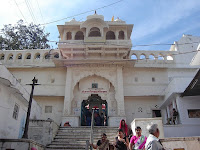 |
| Buddha statue. Vendors sold these, claiming they were real antiques. Incredible India. |
 |
| Merton and the Dalai Lama, India, 1968, that fateful year in history, and the year Merton died. wikicommons. |
Fr. Bacik covered a lot of ground. He noted that before leaving for Asia, Merton had said he was "going home where I have never been before." His kinship with Buddhism was that powerful. He spoke of a oneness. When praying before the Buddha statue in Sri Lanka, he experienced a sense of "spiritual validity fusing together in one aesthetic illumination." Not that Merton ever abandoned his Catholic faith. He went to Asia as a prilgrim, Bacik noted, "to become a better and more enlightened monk."
That's why it seems ironic that Merton's time in Asia marked the end of his spiritual quest on earth: he was electrocuted in Bangkok, Thailand, on December 10, 1968. He was alone after a series of talks, hoping for a respite from the heat and a quiet moment in the solitude he craved. He found it, forever. An accident.
Perhaps more ironic, and serendipitous, is the fact that his body was flown back to America on board a U.S. military aircraft from Vietnam carrying soldiers returning to their final resting place. 1968. That fateful year. Merton and the Vietnam War. The war he spoke against. The war Americans came to hate. The war with no aim, no hope, only death. Who knew that this Catholic monk, a seeker and spiritual guide, accompanied them? "God works in mysterious ways..."
Fr. Bacik is a wonderful lecturer and has a loyal following of intellectually curious souls. He fills up a room, on many levels. Sparks fly, quietly but fervently. He doesn't need notes, powerpoint, other aides. It's enough to share his extraordinary knowledge of Christian theology, Catholic theologians, and Catholic traditions in an orderly and compelling way.
This talk on Merton and Zen Buddhism was brilliant, complicated. It was also I thought exceedingly humble, especially in the dramatic dialogues Bacik constructed between himself and the Zen Masters and between them and the audience. Bacik used examples from our daily lives--of people who are overly busy, overly ambitious, overly needy, anxious or fearful--to demonstrate the process of Buddhist metaphysics, the Buddhist way.
No answers, really, just dialogue, give and take, thought and counterthought, each illustrating and illuminating the ways of being mindful, the power of being in the now, the process of emptying one's mind and expanding one's consciousness.
That's hard for us left-brained intellectuals and scholarly types to comprehend, let alone practice, I thought. We want to ask questions and get answers; if we ask a Zen master how to achieve enlightenment, we want to know how to do it. It's disconcerting to be told, go and wash the dishes, as in an example Bacik gave.
 |
| The Brahma Temple in Pushkar, a white city, a Hindu holy city. |
I felt the same in Sarnath (photo at top), where I met Buddhist monks on a path. I wasn't about to kill any Buddhas on the road, as some have been said to advise! I was overwhelmed with the ancient spirit of the place, and the gritty commercialism of it. Giant stupas called us to stop, look, and listen, while frenzied vendors yelled at us incessantly to buy from them. The vendors sold everything imaginable, including little clay statues of the Buddha, desparately wanting something from us bewildered tourists. We were overwhelmed in a sacred place.
Fr. Bacik's lecture took me back there, to those very perplexed moments in my life. To this day, I have no answers, and to this day I don't push it. I somehow got a powerful message to go along, forget the questions, and let life flow. That was the lesson I learned in India. Perhaps that's a lesson Thomas Merton learned as well, although his accidental death leaves us without his words or his wisdom, with only the silence of a spiritual journey stopped in its tracks.
 |
| Fr. Jim Bacik |
"We might not achieve Buddha mindfulness," Bacik continued, "but we can seek balance in our lives, let go of the past, let go of our earthly desires, let the future take care of itself, accept life as it comes."
And thus Fr. Bacik moved us onto familiar terrain. This we can do. Seek balance in our lives. This is a good place to be, to consider meaning and purpose, our own beliefs, and the mysterious ways our lives move on through time. An intersection of Eastern and Western thought, in harmony.
Fr, Bacik had taken us on the very same journey that Thomas Merton had taken all those many years ago. The same path, in the same way. We experienced a form of Merton's "aesthetic illumination!" I was deeply moved. Merton would be satisfied, I thought.
Note: This is a personal blog; all information about Merton is from Fr. Bacik's lecture and the notes he distributed on the lecture.





No comments:
Post a Comment